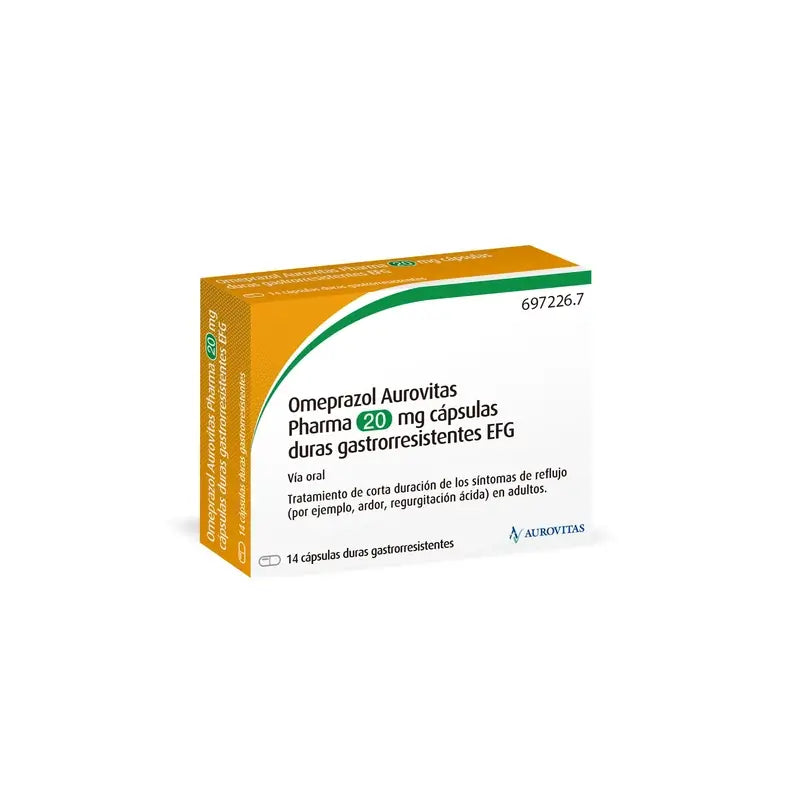Aurovitas Omeprazole Pharma Efg 20 Mg, 14 gastroresistant blister capsules is a medicine belonging to the group of "proton pump inhibitors" and therefore helps to reduce the amount of acid produced by the stomach.

It is a medicine belonging to the group of "proton pump inhibitors", so it helps to reduce the amount of acid produced by the stomach.
It is recommended for adults with conditions such as gastro-oesophageal reflux disease (GORD), ulcers or excess acid. In addition to any other specific indication by the prescribing doctor.
This medicine is taken orally. The dosage of how many capsules and for how long will vary depending on your doctor's advice and your condition and age.
But the recommended dose would be:
In adults with symptoms such as heartburn and regurgitation in GERD disease and mild damage to the oesophagus (something your doctor will have to diagnose) the recommended dose would be 20mg once a day, for about 4-8 weeks. If your doctor thinks it is appropriate for your situation, he will increase the dose for a further 8 weeks if your oesophagus has not healed.
Once healed, a lower dose, i.e. 10mg per day, will be given. Dosage recommended for adults without damage to the oesophagus.
In the case of adults suffering from ulcers in the upper part of the intestine, the dosage would be 20mg per day this time for 2 weeks. On medical prescription, treatment may be prolonged or the dose increased if the ulcer has not healed within this period.
For patients with gastric ulcers, the dosage this time would be 20mg, but for 4 weeks. As in the previous cases, if the doctor considers that the ulcer has not healed in this period, he will prolong the duration and concentration of the medicine.
Also to prevent the development of ulcers in both stomach and duodenal ulcers, a preventive dosage of 10 or 20 mg once daily is recommended. A higher dose should be prescribed by your doctor.
Do not take Omeprazole Aurovitas Spain in any of the following cases, and if in doubt, consult your doctor or pharmacist before taking this medicine:
- If you are allergic to omeprazole or any of the other ingredients of this medicine.
- If you are allergic to medicines containing proton pump inhibitors (e.g. pantoprazole, lansoprazole, rabeprazole, esomeprazole).
- If you are taking a medicine containing nelfinavir (used for HIV infection).
Do not take omeprazole if you are any of the above. If you are not sure, talk to your doctor or pharmacist before taking omeprazole.
If you notice any of the following rare (may affect up to 1 in 1,000 people) or very rare (may affect up to 1 in 10,000 people) but serious side effects, stop taking omeprazole and seek medical advice immediately:
- Sudden wheezing (sudden wheezing), swelling of the lips, tongue and throat or body, skin rash, fainting or difficulty swallowing (severe allergic reaction) (rare).
- Reddening of the skin with blistering or peeling. Severe blistering and bleeding from the lips, eyes, mouth, nose and genitals may also occur. This may be "Stevens-Johnson syndrome" or "toxic epidermal necrolysis". (very rare)
Widespread rash, high body temperature and swollen lymph nodes (DRESS syndrome or drug hypersensitivity syndrome) (rare).
A widespread, red, scaly rash with bumps under the skin and blisters accompanied by fever. Symptoms usually appear at the beginning of treatment (acute generalised exanthematous pustulosis). (rare)
- Yellowing of the skin, dark urine and tiredness, which may be symptoms of liver problems (rare).
Other side effects are:
- Headache.
- Effects on the stomach or intestine: diarrhoea, stomach pain, constipation and gas (flatulence).
- Nausea or vomiting.
- Benign polyps in the stomach.
- Swelling of the feet and ankles.
- Sleep disturbances (insomnia).
- Dizziness, tingling sensation, drowsiness.
- spinning sensation (vertigo).
- Changes in blood tests used to check liver function.
- Skin rash, itching and rashes.
- Feeling of general malaise and lack of energy.
- Blood problems, such as a decrease in white blood cells or platelets. This can cause weakness or bruising and increase the chance of getting infections.
- Low sodium in the blood. May cause weakness, vomiting and cramps.
- Agitation, confusion or depression
- Taste alterations.
- Visual problems, such as blurred vision.
- Sudden feeling of shortness of breath (bronchospasm).
- dry mouth
- inflammation of the inside of the mouth
- Infection called 'candidiasis' which can affect the intestine and is caused by a fungus.
- hair loss (alopecia)
- Skin rash on exposure to sunlight.
- Joint pain (arthralgias) or muscle pain (myalgias).
- Severe kidney problems (interstitial nephritis).
- Increased sweating.
Serious adverse skin reactions have been reported in association with omeprazole treatment including Stevens-Johnson syndrome, toxic epidermal necrolysis (TEN).lysis, drug reaction with eosinophilia and systemic symptoms (DRESS) and acute generalised exanthematous pustulosis (AGEP). Stop taking omeprazole and seek medical advice immediately if you experience any of these symptoms related to the serious adverse skin reactions described in the previous section.
The active substance is omeprazole. Each capsule contains 20 mg omeprazole.
The other ingredients are sugar spheres (consisting of sucrose, maize starch, water), methacrylic acid-ethyl acrylate copolymer dispersion (1:1), hypromellose, talc, mannitol, macrogol 6000, titanium dioxide (E171), polysorbate 80, disodium phosphate, sodium lauryl sulphate.
Capsule shell: gelatin, water, titanium dioxide (E171), quinoline yellow (E104).
Aurovitas Omeprazol Pharma Efg 20 Mg, 14 gastroresistant blister capsules is a stomach protector. It is not recommended to be taken to protect the stomach because you are going to eat or drink a lot. It is recommended for people who have any of the symptoms described above.
The price of non-prescription medicines is established by law. However, at Farmaciasdirect you can buy Aurovitas Omeprazol Pharma Efg 20 Mg , 14 gastroresistant capsules in blister packs with a discount of up to 10%, which is the legal maximum allowed.
